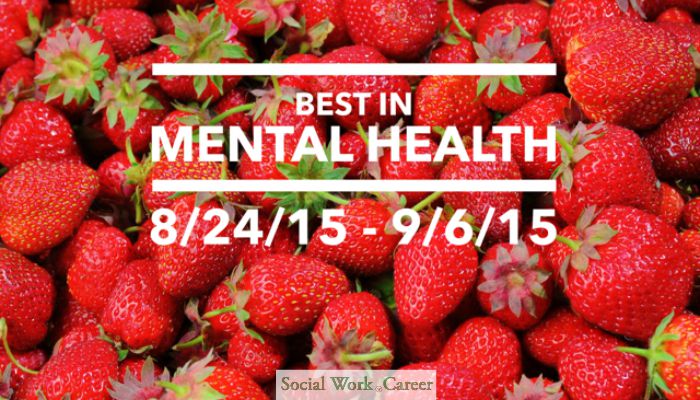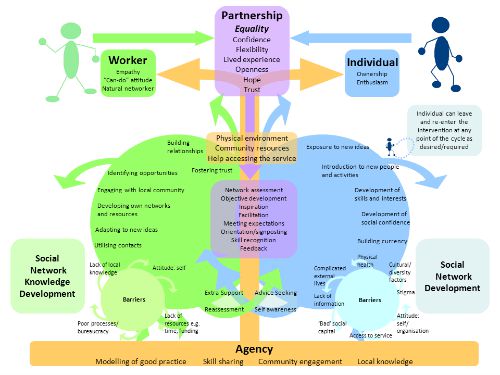Below is a round-up of some of the latest news in mental health (and more)!
This week’s wrap-up has 3 main themes:
- Therapy/Client Sensitivity
- Technology and Mental Health
- Career/NonProfit/Private Practice
Therapy/Client Sensitivity
- Three Alternatives to Self-Injury – Oberg describes the alternatives to self-injury of putting (and peeling off) glue on the hands, snapping a rubber band on the wrist and drawing on self with a marker.
- Being White in America: A Social Worker’s Perspective – Swinford is grateful to have been born with the privileges she has and is sorry for the oppression and pain that continues; she stands with those fighting for equality and justice because “injustice anywhere is a threat to justice everywhere.”
- Do you play enough in your sessions? – Mitchell proposes inviting your clients to occasionally laugh, play or be creative as a way to get unstuck from suffering/pain.
- Dyslexia, self-harm and attempted suicide – Alexander-Passe explains what it is like to be dyslexic and stresses the importance of screening and providing interventions to help dyslexic and other struggling learners.
- Experiencing CBT from the Inside Out: Is Self-Practice Important for CBT Therapists? – after 17 years of research, Bennett-Levy has co-published the first self-practice/self-reflection (SP/SR) manual; therapists’ reflective capacity is enhanced by SP/SR.
- Hip Hop Psych – The Official Hip Hop Psych links hip-hop music and culture with mental health in an effort to increase awareness and remove stigma.
- How Fear Benefits Healing Anxiety and PTSD Symptoms – based upon her experience, Rosenthal explains how the more we more we engage with fear and collaborate with it the more we heal.
- Improving Outcomes While Reducing Time In Residential Treatment – TICTI has a project that is looking for a home; it wants to create a brief intensive trauma therapy diversion program for teens on their way into residential placement.
- Introducing Irlen Syndrome: What Do You Need To Know? – around 50% of children and adults with reading, learning, or attention problems have Irlen Syndrome; it is either inherited or acquired via head trauma/concussions.
- Latino, Hispanic, and Spanish: Differences in Meaning – Thompkins-Jones shares a video in which the important differences between the Latino, Hispanic and Spanish terms are explained.
- Let’s Talk About Suicide: #LanguageMatters – new terms! Singer and Erreger explain how many terms that were once widely accepted have been modified such as suicide attempt-survivor and died by suicide to better honor the dignity and worth of individuals.
- Moving Clients in the Direction of Financial Wellbeing – webinar – Sept 10 at 2PM EST; CFPB presenting financial well-being framework that brings together research, policy and practice.
- Post-Traumatic Growth and Moments of Resonance: Narratives on Ebola in West Africa – [podcast] Dr. Gilpin-Jackson describes the outbreak and what she is learning about post-traumatic growth as individuals make meaning of their experiences.
- The Road of the Dead – Crawford shares her how difficult and exhausting it was to cope with her whirlwind of challenges, crises and grief, as well as some transitional objects/stories.
- A social worker reflects on her experience of working in an integrated hospital social care team – Cheung shares how this arrangement benefits the clients and creates a more supportive and understanding work relationship.
- Setting Boundaries Workbook – Martin offers a free workbook with various hands-on exercises for people-pleasers.
- Understanding Foster Care Youth With The Help of the Documentary Foster Care Film – to better help foster youth, Star recommends watching Yasmin Minstry’s documentary film; it portrays an honest portrayal of Yasmin’s journey through the system and life after foster care.
- What is the sociodemographic recipe for happiness? – while higher educational attainment and increased income was associated with a decreased chance of low mental well-being, there appears to be no relationship between educational achievement, income and high mental well-being.
- Why Therapists Should Help Couples Avoid Divorce – Doherty questions the assumption of “expressive individualism” as being optimal for clients and advocates considering “What would be right for others in your life?”
- Why Transgender Guidelines Serve Everyone – it is important that we view gender as a nonbinary construct (in other words, acknowledge that male and female are not the only genders) and be able to distinguish the difference between gender and sexual orientation.
Technology and Mental Health
- Can massive open online courses promote more trusted evidence, informed decisions, and better health? – MOOCs are massive and you must expect the unexpected, but facilitate the engagement of new contributors interested in evidence-based medicine.
- Connecting People Intervention improves network resourcefulness – to support the recovery and social inclusion of people with mental health problems, Webber recommends provider social and health care services focus more on the connections with the communities in which they are located.
- Cyberbullying Videos to Use in Presentations – Patchin advises against attempting to scare students away from technology and recommends a more engaging and entertaining approach.
- HUD Housing Resource Locator App & Mobile Website – A Review – while app has great potential for researching housing options for individuals and families who are homeless, Thompson suggests some improvements for it to be effective.
- Internet delivers mixed messages for older people – new report older people commonly express ambivalence about internet connectivity and thus may miss out on opportunities for social engagement.
- Online Toolkit for developing a Personal Learning Network with Twitter – Hitchcock provides social work educators with hands-on exercises to help their students to develop their own PLNs.
- Online Toolkit for New Social Workers – (Own post) – gives social work educators a new social worker career toolkit with suggested activities to prepare students for entering social work practice.
- People Drive Digital #PDDigital at NHS Expo 2015 – Victoria shares her White paper advocating for people driving digital innovation from the ground up to be recognized and supported at a strategic level so as to transform healthcare.
- Social Work + Periscope = Win – Ignacio explains via video and blog what periscope is, its benefits and offers some suggestions on how you may use it to enhance your social work practice.
Career/NonProfit/Private Practice
- How to Create a Rich Social Work Mentality (Infographic + Workbook) – Ford provides a workbook to help you assess your readiness to change, examine your hidden disempowering beliefs about money and additional steps to creating a wealthier mentality.
- I Planned A Workshop…Nobody Came! – Mitchell shares the steps that goes into preparing for a workshop and and advises not to take no-shows on a drop-in workshop personally.
- A Psychotherapist’s Out-of-Office Email Response – Suttle and Garcia share an example of an away on vacation response that not only provides emergency coverage from an available colleague but also helpful resources to clients.
- Resource: The Emerging Nonprofit Leaders Playbook – Kanter shares [free] practical tools grounded in research along with exercises to guide reflection, growth, and organizational best practices.
- Take This Test To Figure Out Your Dream Job – Crispo shares a formula from Forbes with variables such as compensation, satisfaction, etc; when your Confidence Factor is 75% or higher, you’re on the right track to a great fit.
- Technology Tutor: What you need to know about credit cards – despite the additional information you need to be aware of, Reinhardt highly recommends you consider accepting credit cards (and not pass on swipe fees to clients).
Like this Post? Please Share it!




